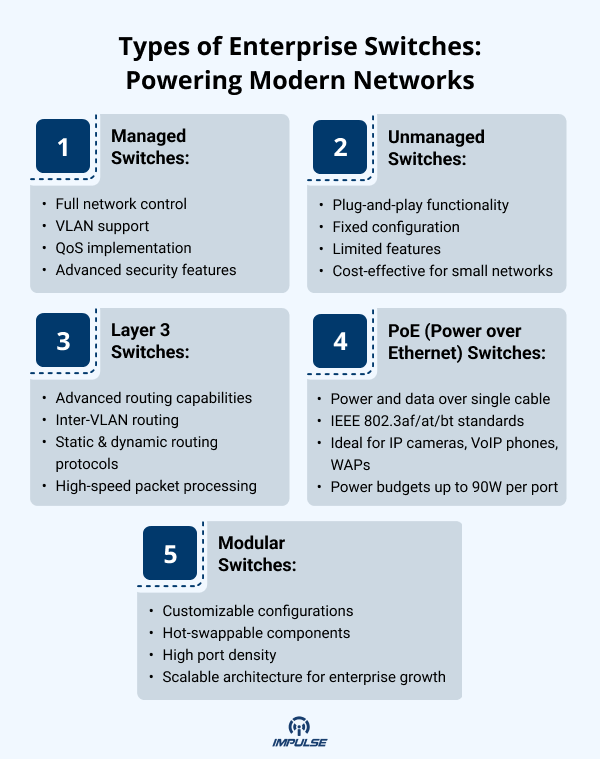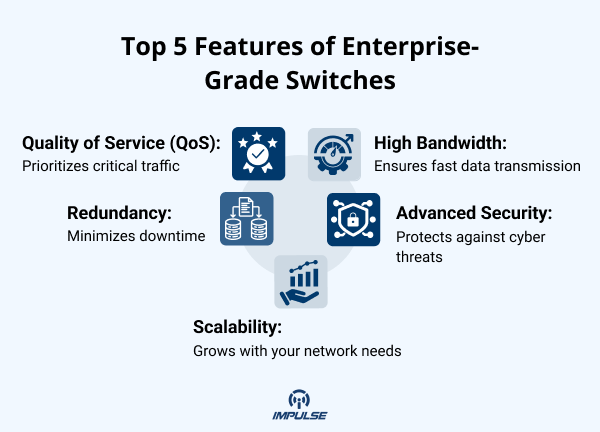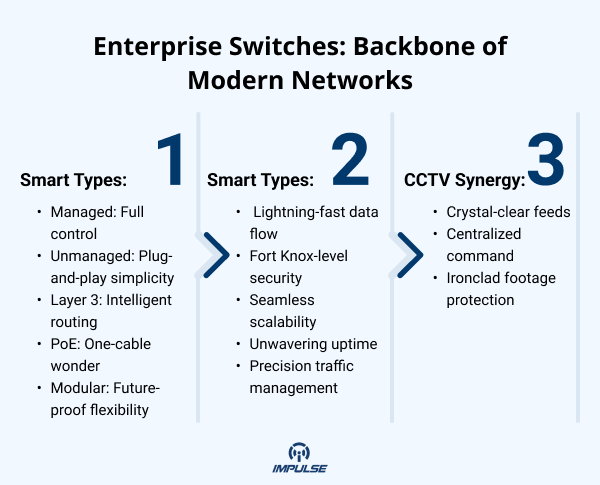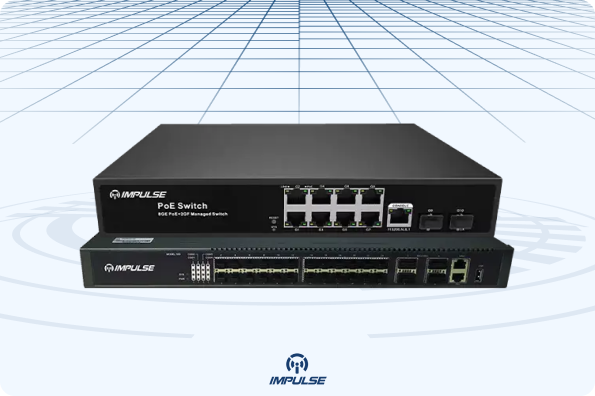When it comes to building a robust and secure network infrastructure, enterprise-grade switches play an essential role. Whether you’re a large corporation or a growing small business, the right network switches can make a substantial difference in network performance, security, and overall productivity. In this blog, we’ll walk through everything you need to know about enterprise-grade switches, including their features, benefits, and tips on choosing the best options.
What Are Enterprise-Grade Switches?
Enterprise-grade switches are high-performance, durable networking devices designed specifically for larger, more demanding environments. Unlike basic network switches used in home or small office setups, these enterprise switches are crafted to support extensive data traffic, numerous connected devices, and complex security requirements.

Key Features of Enterprise Switches
Enterprise-grade switches are equipped with advanced functionalities that set them apart from basic Ethernet switches. Here are some of their core features:
- High Bandwidth & Port Density Enterprise switches typically come with a higher number of ports and bandwidth capacities, allowing multiple devices and large data flows to operate simultaneously without network slowdowns.
- Advanced Security Features Security is crucial for businesses handling sensitive information. Enterprise switches come with enhanced features like Access Control Lists (ACLs), VLAN segmentation, and 802.1X authentication, offering multiple layers of security.
- Scalability Designed with the future in mind, these switches can grow with your network. You can scale up by stacking multiple switches or adding new modules as needed, which helps accommodate more devices and users without replacing the entire network infrastructure.
- Redundancy and Reliability To minimize downtime, enterprise-grade switches often have redundancy features like dual power supplies, automated failover, and backup connections. These ensure continuous network performance, even if one component fails.
- Quality of Service (QoS) QoS features in enterprise switches allow administrators to prioritize certain types of traffic, such as video calls, to ensure high-quality performance and minimal lag.
Also Read: Secure Your Business: High-Definition Security Cameras for Peace of Mind
Why Your Business Needs Enterprise-Grade Switches
Opting for enterprise-grade network switches is essential for businesses aiming for a fast, secure, and resilient network. Let’s explore some of the primary reasons to invest in enterprise switches:
- Enhanced Security With advanced security features, business switches help protect against cyber threats, data breaches, and unauthorized access, ensuring your data stays secure.
- Better Performance Enterprise-grade switches offer high-speed data processing, making them ideal for handling multiple simultaneous connections without impacting network speed. This is essential in high-demand environments, such as when using a network switch for CCTV.
- Efficient Data Management By allowing centralized data management, enterprise switches make it easier to control network traffic, optimize resources, and prevent network bottlenecks.
- Future-Proofing With modular and scalable features, enterprise switches are adaptable, helping businesses save money in the long run by accommodating network growth without frequent upgrades.
- Reduced Downtime The redundancy features in enterprise-grade switches minimize downtime, which is critical for operations that require constant connectivity, such as streaming or CCTV monitoring for security.
Types of Enterprise-Grade Switches
Enterprise switches come in various types, each tailored to specific business needs. Here’s a brief overview of some popular switch types:
1. Managed Switches: Managed switches offer complete control over network configurations, security policies, and traffic prioritization. They provide advanced features like VLAN support, QoS implementation, and detailed performance monitoring. These switches are ideal for businesses with in-house IT expertise and complex network requirements.
2. Unmanaged Switches: These are basic switches with plug-and-play functionality, ideal for smaller setups or branch offices that do not need extensive control. Unmanaged switches are cost-effective and easy to deploy, making them suitable for simple network expansions or small businesses with limited IT resources.
3. Layer 3 Switches: Layer 3 switches combine the features of a switch and a router, allowing them to handle more complex routing decisions. They support inter-VLAN routing, static and dynamic routing protocols, and high-speed packet processing. These switches are best suited for larger, segmented networks that require advanced traffic management and network segmentation.

4. PoE (Power over Ethernet) Switches: These switches are perfect for powering devices like IP cameras, VoIP phones, and wireless access points, eliminating the need for separate power sources. PoE switches simplify installation, reduce cabling costs, and provide centralized power management. They come in various power capacities to suit different device requirements, from standard 15.4W to high-power 90W per port.
5. Modular Switches: Modular switches offer a flexible and scalable solution for growing enterprises. They feature a chassis with removable line cards, allowing businesses to add or upgrade ports and features as needed. This design provides high port density, customizable configurations, and the ability to adapt to changing network demands without replacing the entire switch.
Choosing the Right Enterprise-Grade Switch for Your Business
Selecting the right network switches for your business depends on factors like the size of your network, security requirements, and future growth plans. Here are some tips:
- Assess Your Needs Start by understanding your network’s size and traffic demands. For small businesses, a high-performance managed switch might be enough. Larger enterprises may need more complex setups like Layer 3 or modular switches.
- Prioritize Security Look for switches with built-in security features, especially if your business handles sensitive data. Consider switches that support encryption, VLANs, and ACLs.
- Consider Scalability Invest in switches that allow for future expansion. Modular switches or stackable models are great choices for businesses expecting growth.
- PoE for Devices If your setup includes devices like CCTV cameras or access points, network switches with Power over Ethernet (PoE) capabilities simplify power and data cabling requirements.
- Vendor Support Opt for reputable brands with solid customer support. This ensures you can quickly resolve any issues and access software updates or additional resources as needed.

How Enterprise Switches Support CCTV and Security
For businesses focused on security, enterprise switches are invaluable in supporting CCTV and IP surveillance systems. With network switches for CCTV, you can achieve:
- High-Quality Video Transmission Enterprise switches can handle the large amounts of data generated by CCTV cameras, allowing for clear, uninterrupted video feeds.
- Centralized Monitoring With managed switches, you can centralize your network, making it easy to monitor and control multiple CCTV feeds from a single location.
- Enhanced Security for Footage The built-in security features in enterprise switches protect CCTV footage from unauthorized access, ensuring data privacy and compliance.

Key Benefits of Enterprise Switches in Real-World Scenarios
1. Retail Stores
Retailers often use PoE enterprise switches to power security cameras and Wi-Fi access points, ensuring both security and connectivity for customers and staff.
2. Healthcare Facilities
Hospitals require high-speed data transfers for medical records and secure networks for patient data. Enterprise switches provide secure and efficient data management in healthcare environments.
3. Corporate Offices
With a high number of connected devices and data demands, corporate offices use enterprise-grade switches to ensure seamless and secure operations.

Also Read: DIN Rail Mount Ethernet Switches: Versatility in Networking
Conclusion
Enterprise-grade switches are essential for building a secure, reliable, and scalable network infrastructure that meets the demands of modern businesses. Whether your priority is high bandwidth, enhanced security, or scalability, enterprise switches offer the features and flexibility needed for today’s network environments. As technology advances, these switches remain vital for supporting devices, from CCTV cameras to essential business applications, ensuring a stable and resilient network.
Explore Impulse CCTV’s advanced solutions to build a scalable network. Contact us today to learn about our business switches and tailored network solutions.


